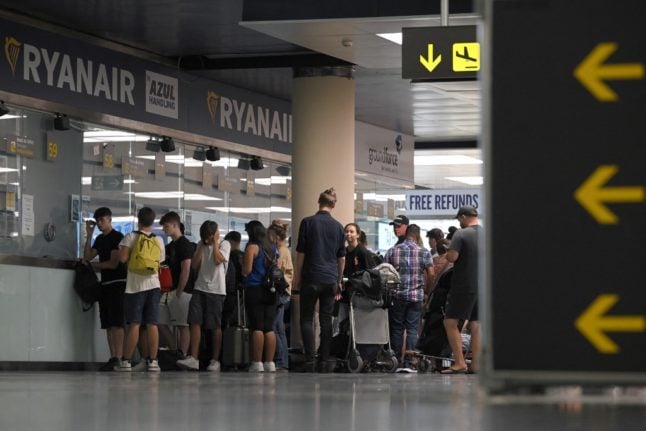Coming at the peak summer tourist season, the new Ryanair stoppages only add problems to a sector struggling with rolling strikes staff at budget rival EasyJet which will resume this weekend.
Four of the Ryanair cancellations affected flights flying into or out of Barcelona, while the other two involved arrivals and departures from Palma de Mallorca, said one of the two unions which called the strike, the Union Sindical Obrera (USO).
Another 28 flights were delayed as of 9:00 am (0700 GMT), it added in a statement.
Ryanair cabin crew in Spain staged a series of rolling strikes in June and July.
The USO and SITCPLA unions then called a third wave of 24-hour work stoppages from August 8 until January 7, 2023, arguing that Ryanair had refused “to engage in any dialogue”.
The strikes will take place every week, from Monday to Thursday.
The unions say Ryanair is the only international company in Spain not to have a collective agreement.
The carrier, for its part, has said that the strikes have had little impact on its activity in Spain, where it operates more than 650 routes.
A statement sent to The Local by Ryanair’s communications team reads: “As a result of strikes by two cabin crew unions in Spain, Ryanair expects little disruption to its 3,000 flights a day during August and September. Ryanair has already concluded a labour agreement with the main Spanish cabin crew union (CCOO).
“(According to) official airline sources, these two unions, which represent a small proportion of our Spanish cabin crew, have carried out a series of poorly supported “strikes” in June and July that have had little or no impact on Ryanair flights to/from Spain. In July alone, Ryanair operated more than 3,000 daily flights and carried a record 16.8 million passengers, many of them to/from Spain. Ryanair hopes that these latest strike threats, which only affect a small proportion of our Spanish cabin crew, will have no impact on our flights to/from Spain during August and September.
“It is worth mentioning that although a small number of flights in Spain were cancelled or delayed in July, this was mainly due to ATC strikes and flight delays. No flights were cancelled in July due to strikes called by USO and Sitcpla. The vast majority of Ryanair’s Spanish cabin crew are represented by the CCOO union, which has already reached a labour agreement with Ryanair covering most of our Spanish cabin crew”.
EasyJet pilots in Spain have since August 12th staged weekly three-day strikes to call for the reinstatement of conditions they enjoyed before the pandemic.
Their next work stoppage will start on Saturday.
The strike began just two weeks after the airline’s cabin crew went on strike, resulting in a deal.
Meanwhile cabin crew at Iberia Express, the low-cost arm of Spain’s Iberia national carrier, are also expected to stage a 10-day strike from August 28th to September 6th, the USO union has said.
READ MORE: Cabin crew at Spain’s Iberia Express set to strike for ten days



 Please whitelist us to continue reading.
Please whitelist us to continue reading.
Member comments